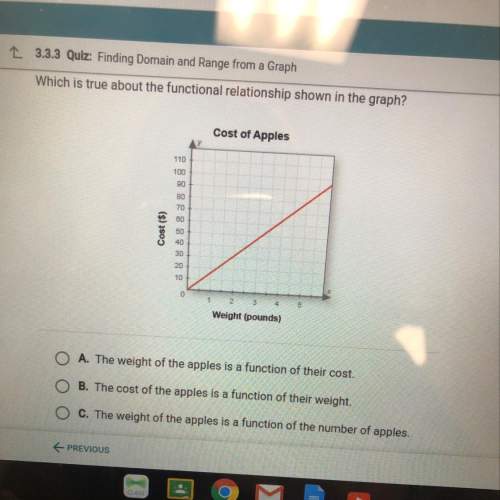
Mathematics, 11.06.2021 17:10 Svetakotok
Suppose F⃗ (x, y)=(x+3)i⃗ +(6y+3)j⃗ . Use the fundamental theorem of line integrals to calculate the following.
(a) The line integral of F⃗ along the line segment C from the point P=(1,0) to the point Q=(3,3).
∫CF⃗ ⋅dr⃗ =?
(b) The line integral of F⃗ along the triangle C from the origin to the point P=(1,0) to the point Q=(3,3) and back to the origin.
∫CF⃗ ⋅dr⃗ =?


Answers: 1


Another question on Mathematics

Mathematics, 21.06.2019 13:30
The graph of which of the following will be parallel to the graph of 4x – 3y = –12? a.y= 4/3x -3/2 b.6x-4y=-8 c. y=3/4x+1 d.4x- 2y=-12
Answers: 2

Mathematics, 21.06.2019 15:10
Drag each sequence of transformations to the correct location on the table. classify the sequences of transformations based on whether or not they prove the congruency of the shapes by mapping shape i onto shape ii. plz i'll rate u 5 stars need this done for a mastery test
Answers: 1

Mathematics, 21.06.2019 22:00
State one method by which you can recognize a perfect square trinomial.
Answers: 1

Mathematics, 21.06.2019 23:00
Which geometric principle is used to justify the construction below?
Answers: 1
You know the right answer?
Suppose F⃗ (x, y)=(x+3)i⃗ +(6y+3)j⃗ . Use the fundamental theorem of line integrals to calculate the...
Questions


Mathematics, 20.01.2020 01:31

English, 20.01.2020 01:31

Chemistry, 20.01.2020 01:31



Spanish, 20.01.2020 01:31


Social Studies, 20.01.2020 01:31

Chemistry, 20.01.2020 01:31



Mathematics, 20.01.2020 01:31



Mathematics, 20.01.2020 01:31



Mathematics, 20.01.2020 01:31

Mathematics, 20.01.2020 01:31




